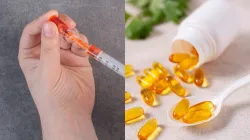Single dose of Vitamin D injection can adversely impact kidney and bone health, warn doctors
While vitamin D is an essential nutrient for our overall health, a single dose of vitamin D injection can have adverse effects on kidney and bone health. It is important to consult with a healthcare professional before considering such high-dose supplements.

Vitamin D is a crucial nutrient for our body and serves a vital function in keeping our health. It helps to control calcium and phosphate levels in the body, which is very much required for the healthy formation of bones and teeth. Some individuals need supplements to supplement their daily intake.
The single injection of a high dose of vitamin D has recently raised some concerns; doctors, for instance, warned that such a single vitamin D injection is harmful to kidneys and bone health. So, there's a need to educate the public on these risks.
Vitamin D and Kidney Health
The recommended daily intake of vitamin D in adults is 800-1000 international units (IU). However, some doctors may prescribe higher doses for people with vitamin D deficiency or certain medical conditions. In such cases, a single-dose injection may seem like a convenient option compared to taking daily supplements. However, this practice may do more harm than good.
One of the major issues highlighted by doctors is the risk of kidney problems. Vitamin D in large amounts causes calcium levels to build up in the blood, a condition referred to as hypercalcemia. Such elevated calcium may cause stones in the kidneys and damage to the kidneys. The risk may also be greater for individuals with pre-existing kidney disease.
According to the TOI report, Dr Ravinder Goswami from AIIMS said, "A 6,00,000-unit vitamin D injection could adversely affect bone health." It can adversely affect kidney health too. He also added, "A monthly 60,000 IU sachet is adequate to maintain normal levels."
Effects of a single dose of vitamin D injection
Furthermore, in a single dose of injection, vitamin D toxicity can occur in the patients. That is a very rare but deadly condition where the body carries excess vitamin D. Symptoms such as nausea, vomiting, constipation, and muscle weakness are all signs and symptoms of vitamin D intoxication. Severe cases will cause kidney damage, abnormalities in heart rhythms, and death.
So, what are the alternatives to a single dose of vitamin D injection?
Firstly, it is important to understand that most people do not need such high doses of vitamin D. For those with vitamin D deficiency, daily supplements or increasing sun exposure can help meet their daily requirements without the risk of adverse effects. Besides that, a healthy diet containing foods rich in vitamin D, like fatty fish and fortified dairy products, will also help maintain adequate levels. However, one can take Cholecalciferol (D3) which is effective and environmental but one must definitely avoid taking nano vitamin D, calcitriol and injectables.
ALSO READ: Say goodbye to Vitamin D deficiency by consuming THESE vitamin-rich foods every day
